- Home
- SUSTAINABILITY
- Empowering People Through the Power of Beauty
Empowering People Through the Power of Beauty
Cultivating Self-Efficacy Through the Power of Beauty
At Shiseido, we take a scientific approach to uncovering the power of beauty to enrich minds, spark joy, and bring happiness to life. This pursuit started in 1956 with the launch of Japan’s first makeup product designed to lessen the suffering of wartime burn victims, and we continue to explore ways to harness the power of beauty, such as the development of specialized cosmetics and application techniques to address the changes in a person’s appearance from discolorations and scars. We collaborate with various support groups, medical institutions, and local governments in activities that leverage the power of beauty to promote the mental, physical, and social well-being* of people facing broad skin concerns and challenges.
- *Social well-being is defined as the sustaining of meaningful relationships with society and people.
Social Area Leaders and Social Area Partners:
Employees Dedicated to Social Initiatives in Partnership with Local Communities and Governments
In Japan, 7 Social Area Leaders and 43 Social Area Partners from Shiseido Japan Co., Ltd. work exclusively on social initiatives. These specialists are equipped with the knowledge and skills necessary for social contribution engagement and have taken the lead in designing and carrying out tailored initiatives that respond to local characteristics and specific challenges. In 2024, they contributed to a cumulative total of 2,367 activities, approximately 40% of which were newly developed, thereby strengthening their role as drivers of local community engagement. Examples of their work include cosmetic therapy seminars for older people, appearance care seminars for people undergoing cancer treatment, Shiseido Guide Makeup seminars for individuals with visual impairments, and personal appearance hands-on sessions for students and new professionals. Through these activities, they help foster positive social participation among a diverse range of individuals.
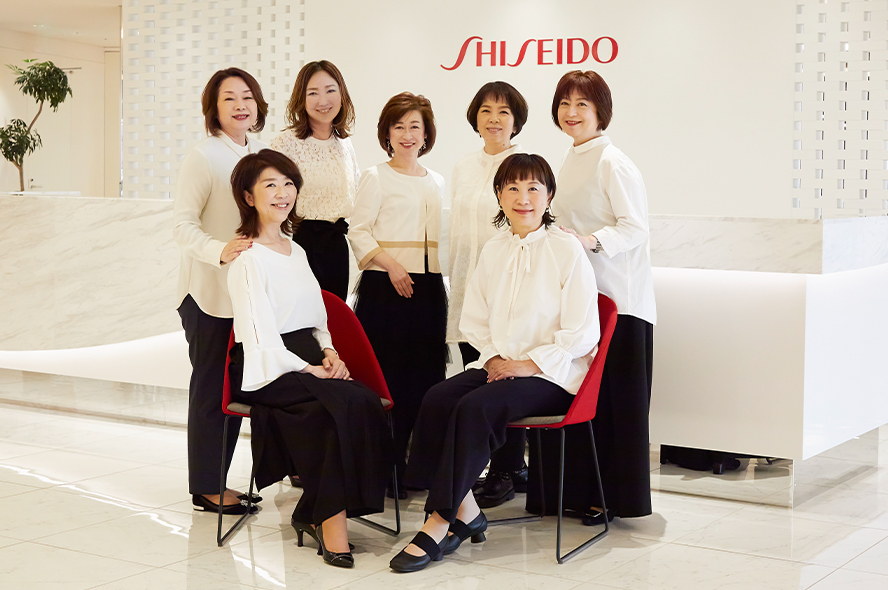
Social Area Leaders
From 2022 to 2024, Shiseido Japan entered into partnership agreements with 8 local governments across Japan—Hokkaido, Yamagata, Tochigi, Osaka, Hiroshima, Sapporo, Matsuyama, and Komatsushima—building strong relationships within each community. One such example in 2024 was the Sapporo Wellness Partner Agreement, a collaboration with the City of Sapporo. Through joint efforts such as awareness campaigns and information-sharing, we aim to contribute to healthier and more fulfilling lives for Sapporo citizens.
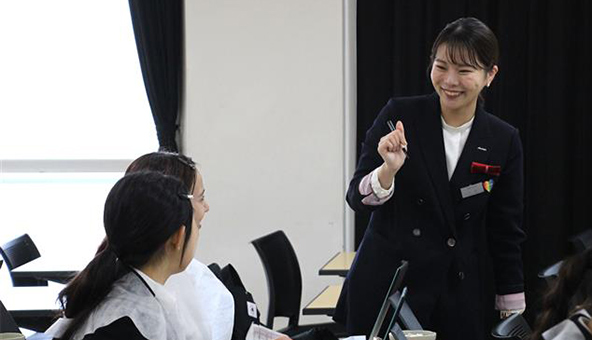
Personal appearance hands-on sessions at a police academy
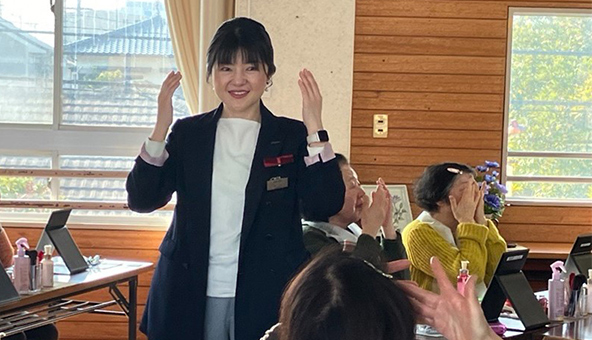
Mind and body refresh seminar for elderly people
Evolving with Decades of Expertise to Embrace Greater Diversity: The Evolution of the Perfect Cover
Shiseido Life Quality Makeup began with the introduction of Japan’s first makeup products for people living with burn scars in the postwar years, and it now marks with approximately 70 years of ongoing activity. During this time, it has grown into a social support initiative aimed at improving quality of life by developing the dedicated brand Perfect Cover and sharing appearance care information for people experiencing changes in appearance due to cancer treatment.
To mark the 30th anniversary of the Perfect Cover brand, we carried out a full renewal. Designed to support individuals who wish to stay true to themselves through coverage, the products are expertly developed to address deep skin concerns, such as birthmarks, vitiligo, burn scars, and discoloration from cancer treatment. An expanded range of up to 18 shades for the foundation reflects diverse global skin tones, complemented by a newly developed lineup of items created in response to user feedback.
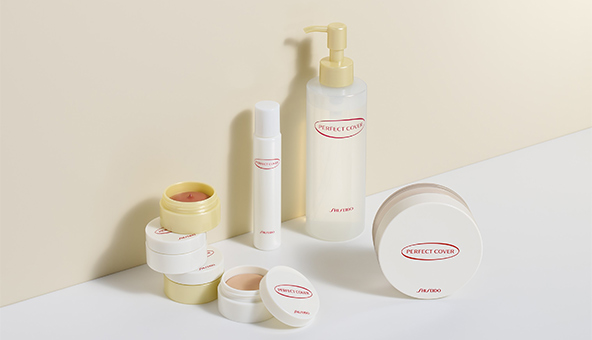
Perfect Cover renewal, February 2025
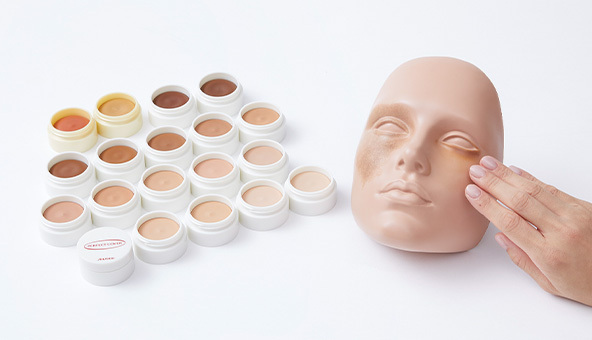
Shiseido Life Quality Makeup for deep skin concerns
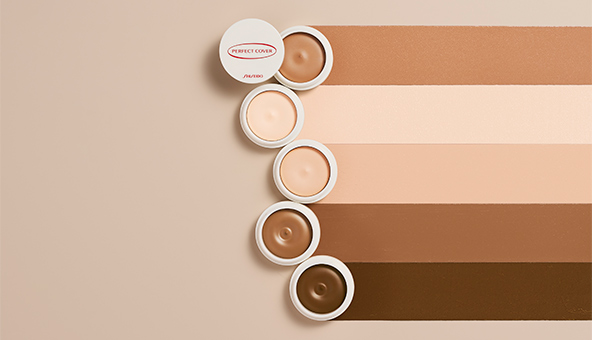
Shade range to cater to diverse global skin tones
Through Shiseido Life Quality Makeup, we are committed to supporting people of all ages, conditions, and abilities in taking a step forward as their authentic selves. This initiative was recognized by the Association of Consumer Affairs Professionals (ACAP) at the 10th ACAP Awards for Consumer-Oriented Activities. The award honors our efforts to provide free knowledge and support for individuals with deep skin concerns, as well as our sustainable partnerships with local governments and medical institutions.
Today, we operate Shiseido Life Quality Beauty Centers in the countries and regions of Japan, Singapore, and Taiwan. In 2025, we are expanding to France and partnering with support organizations such as the French Vitiligo Association.
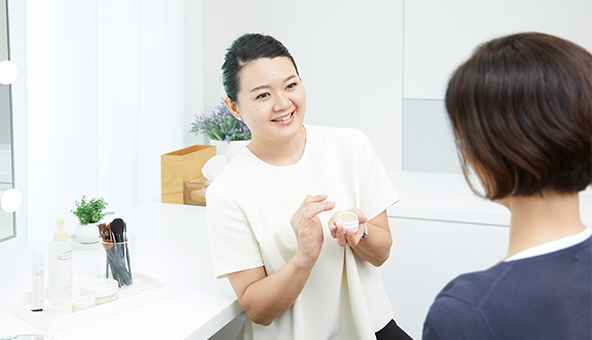
Consultation at the Shiseido Life Quality Beauty Center (Japan)
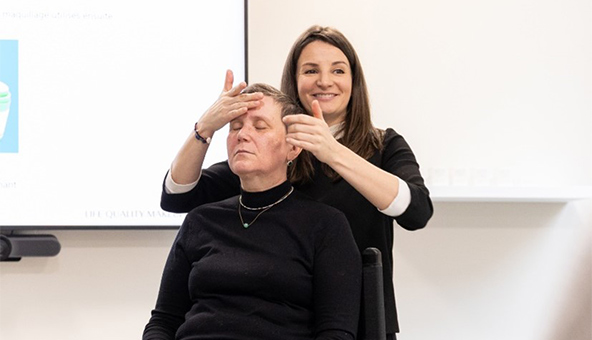
Activity in partnership with the French Vitiligo Association
Global Expansion of the LAVENDER RING MAKEUP & PHOTOS WITH SMILES for People Living with Cancer
Since 2017, Shiseido has participated in the LAVENDER RING project to support people living with cancer, pursuing a society where individuals can live with a smile, even while facing cancer. We lead the MAKEUP & PHOTOS WITH SMILES initiative, encouraging people to live their own lives after cancer and supporting their reintegration into society through hair and makeup services, as well as portrait photography. In recognition of these efforts, Shiseido received the Mécénat Award for Excellence in November 2021 from the Association for Corporate Support of the Arts, a public interest incorporated association in Japan.
Since 2022, LAVENDER RING MAKEUP & PHOTOS WITH SMILES has expanded globally to China, Singapore, Taiwan, and Thailand. In 2024, the program was introduced in Malaysia and the Philippines, bringing the total number of participating countries and regions to seven. Working with medical institutions and patient groups, we have held 38 MAKEUP & PHOTOS WITH SMILES events to date, welcoming over 1,000 groups of people living with cancer.*
On World Cancer Day in 2021, LAVENDER RING published its first book in Japan, LAVENDER RING Photo Book: Smiles and Messages from 206 People Living with Cancer. This was followed in 2024 by a Taiwan edition inspired by the same concept, with a launch event held at a major bookstore to commemorate the occasion. The featured poster portraits and interviews with people living with cancer resonate with, inspire, and encourage readers—not only those living with cancer, but also their families and supporters.
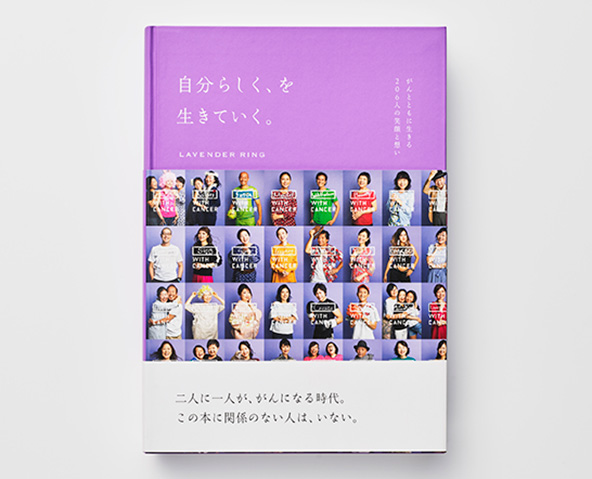
LAVENDER RING Photo Book: Smiles and Messages from 206 People Living
with Cancer (Hearst Fujingaho Co., Ltd.)
- *As of the end of December 2024 (including online events)
Click here for the LAVENDER RING website
Click here for the MAKEUP & PHOTOS WITH SMILES website
Click here for the LAVENDER RING photo book
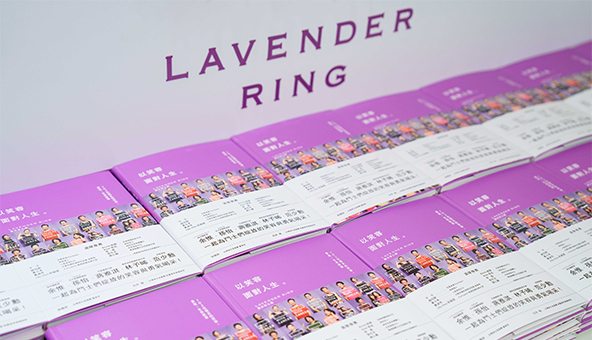
Publication of the LAVENDER RING photo book (Taiwan Edition), August 2024
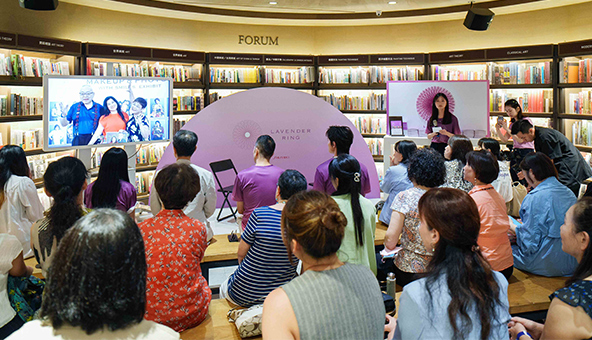
Scenes from the book launch event in Taiwan, August 2024
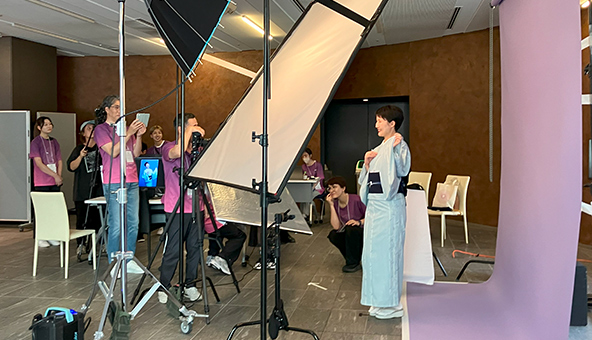
Event in Tokyo, August 2024
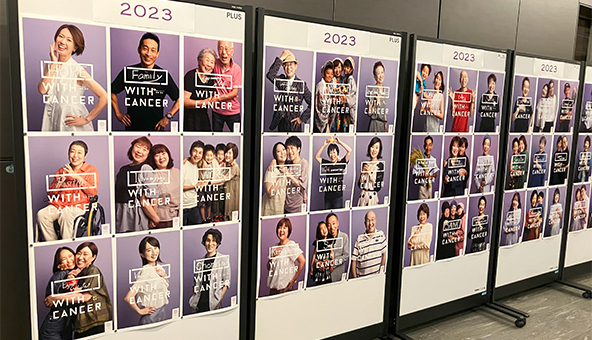
Poster exhibit in Tokyo, August 2024
ANESSA Sunshine Project to Support Children’s Mind and Physical Growth
In 2024, Shiseido’s sunscreen brand ANESSA launched the ANESSA Sunshine Project, a new initiative aimed at supporting the healthy growth of children’s minds and bodies through activities in the sun*¹.
Playing outside nurtures five key areas of child development (physical, emotional, social, intellectual, and psychological) and supports the growth of autonomic function, which underlies essential life skills such as motivation and spontaneity*². The ANESSA Sunshine Project organizes events that encourage children to build the habit of choosing to play outside on their own, while also providing educators and families with information about UV protection.
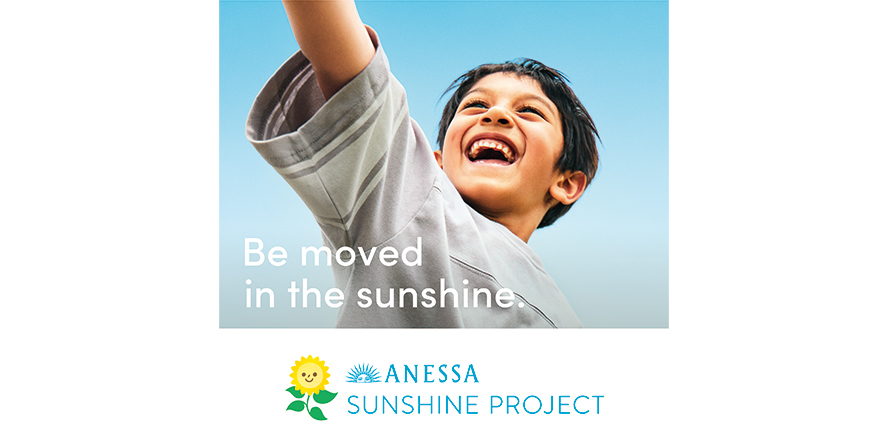
ANESSA Sunshine Project
As part of the initiative, ANESSA became the first cosmetics brand to sign a Social Value Partnership with the Japan Football Association (JFA) under the JFA PARTNERSHIP PROJECT for DREAM. As a JFA Social Value Partner, ANESSA collaborated with the JFA to host interactive events for children and families. These events included UV-protection seminars to promote safe sun exposure and a variety of outdoor activities.
- *1:China, Hong Kong, Indonesia, Japan, Korea, Macau, Malaysia, the Philippines, Singapore, Taiwan, Thailand, and Vietnam
- *2:Based on research by Dr. Akira Maehashi, Ph.D. (Medicine), Professor at the Faculty of Human Sciences, Waseda University, and a leading expert in child health and welfare
Click here for the press release on the ANESSA Sunshine Project
Click here for the press release on the JFA Social Value Partnership
ANESSA Sunshine Project Expert Interview: Outdoor Play and Child Development (Japanese)
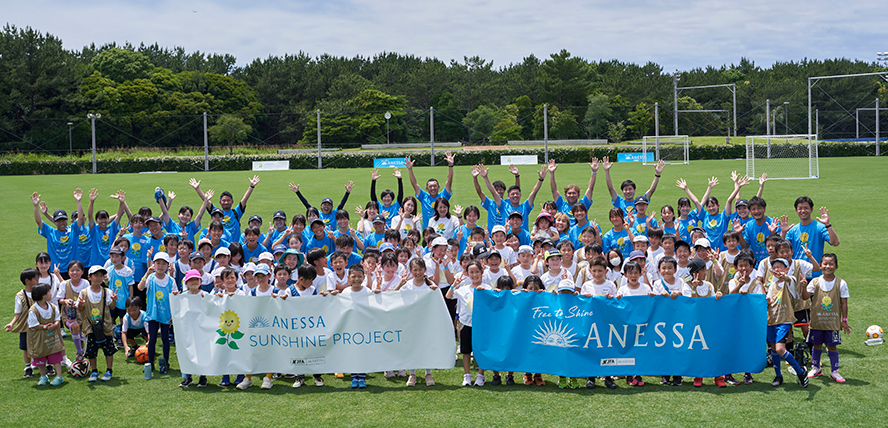
ANESSA Sunshine Project in partnership with JFA
Support for Patients with Xeroderma Pigmentosum
Since 2000, Shiseido has supported people living with Xeroderma Pigmentosum (XP)—a condition characterized by extreme sun sensitivity—through sunscreen donations and seminars led by Shiseido researchers and beauty consultants.
At these seminars, they explain how to effectively protect the skin so that patients with XP can enjoy the outdoors. Since 2005, Shiseido has also provided financial aid for patient exchange meetings through voluntary donations from participating employees’ salaries (Shiseido Camellia Fund).
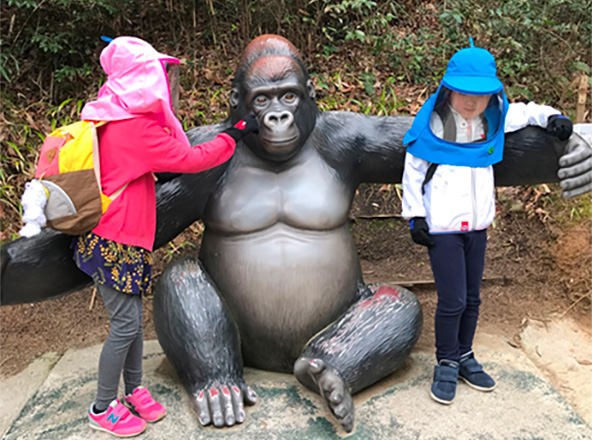
Support for patients with Xeroderma Pigmentosum
Click here for Camelia Fund website
Click here to learn about ANESSA’s support for xeroderma pigmentosum (XP) patients (in Japanese only)
Collaborating with Partner Organizations in Support Programs for Elderly People
Japan is experiencing the highest rate of population aging in the world, with its aging rate*1 now*2 at 29.3%. Japan’s Ministry of Health, Labour and Welfare issued guidelines to promote the healthy lifestyles of residents in local communities, and this inspired the creation of support structures for elderly people and people living with cancer nationwide.
Shiseido Japan supports this initiative by reinforcing partnerships with retail partners, support groups, medical institutions, and local governments in different regions of Japan to enrich the social lives of elderly people. Together, we offer beauty workshops for elderly people designed to promote a healthy life expectancy. For instance, in Saitama, Shiseido Japan, local Community General Support Centers, and Welcia Yakkyoku Co., Ltd., jointly held 57 workshops for elderly people at 11 Welcafe locations, the community spaces inside Welcia pharmacies in 2024.
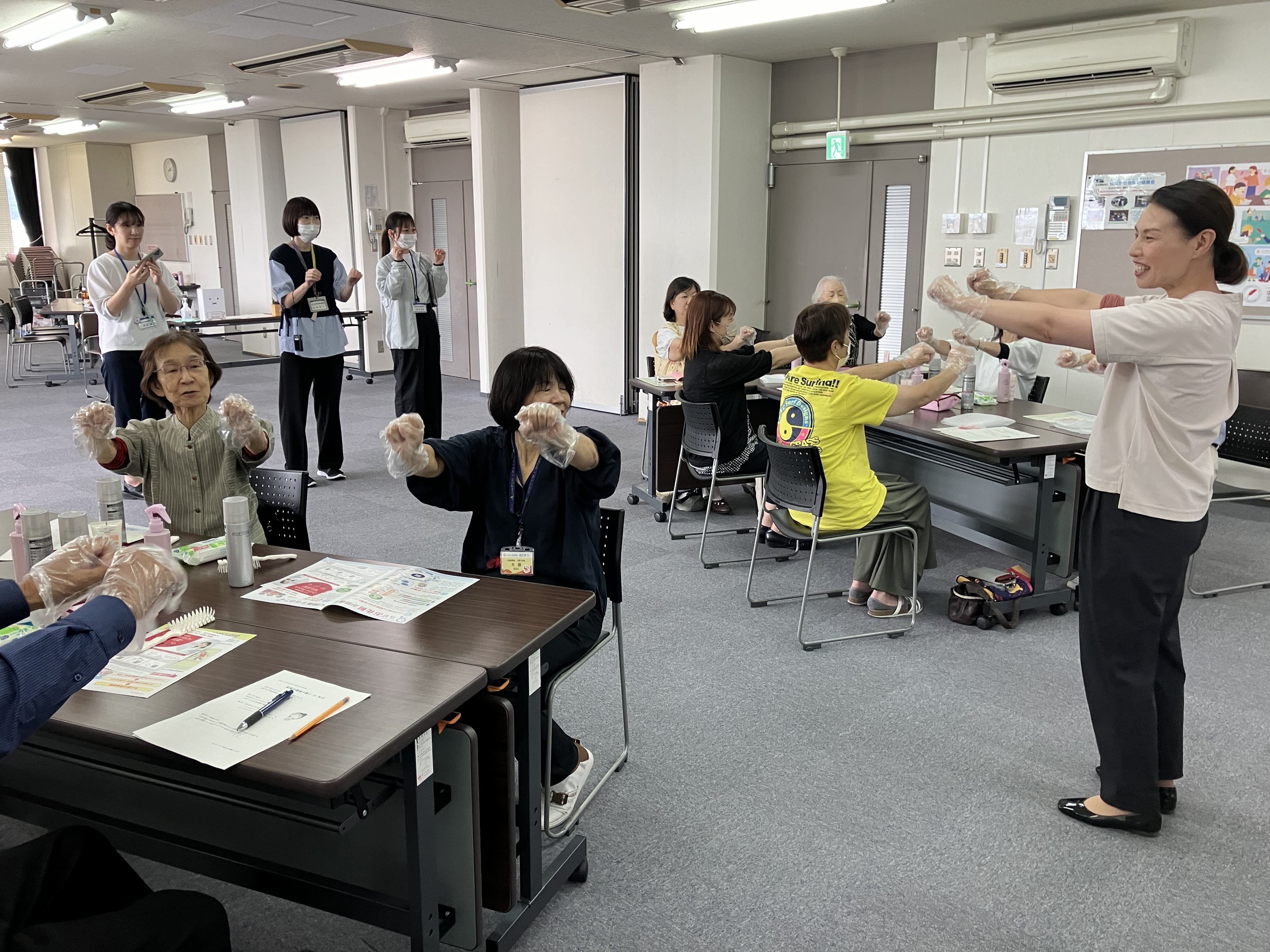
Beauty workshops for elderly people
- *1:The aging rate is the proportion of a society's population that comprises persons aged 65 or older.
- *2:Based on data published in 2024 by Japan’s Ministry of Internal Affairs and Communications
Support for People with Disabilities
In 2024, Shiseido enhanced its free beauty consultation platform, Online Beauty, with the addition of a service for deaf and hard of hearing people. The new service enables them to receive beauty consultations more easily through online sessions tailored to their preferred communication method, whether that be sign language, lip reading, or chat. We will continue improving upon it by incorporating user feedback.
At Shiseido Japan, Guide Makeup—our original method designed to help blind and low vision people to apply makeup independently—is part of the Shiseido Life Quality Beauty Seminar. Also, the program now offers expanded offerings of online workshops for people with vision-related needs. Reaching out to individuals with diverse support needs, including those associated with intellectual and developmental conditions, we advocate for a society where everyone can express themselves and live authentically through the power of beauty.
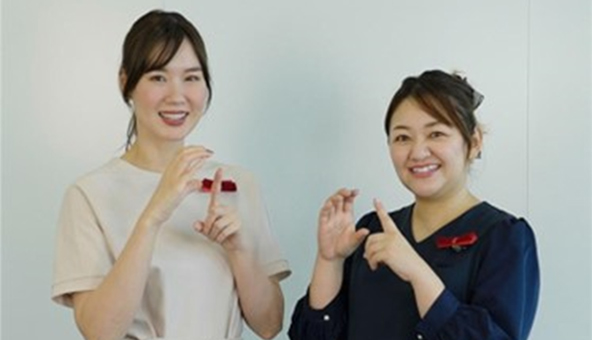
Online consultation specialists
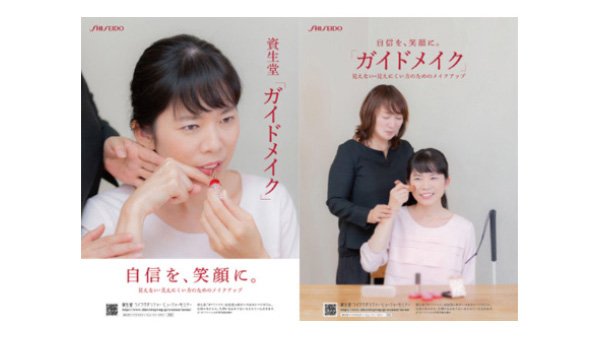
Poster for Shiseido Guide Makeup
Challenging the Unconscious Biases and Prejudices that Limit Individual Beauty
As a cosmetics company that celebrates diversity in beauty, Shiseido launched a global project to challenge prejudices and stereotypes that prevent people from achieving their desired beauty—referred to as unconscious beauty biases (UBBs). In addition, we are committed to supporting the LGBTQ+ community and its allies* inside and outside the company. This demonstrates our commitment to achieving a world where everyone can live their lives and celebrate each other’s beauty, regardless of gender, age, or nationality.
- *An ally is someone who supports and stands with LGBTQ+ individuals.
Supporting the LGBTQ+ Community
In Japan, highly skilled Social Area Leaders and Social Area Partners from Shiseido Japan are at the forefront of promoting support for LGBTQ+ communities in their respective regions.
In 2024, we participated in Pride events in Tokyo, Gunma, Nagoya, Osaka, and Hiroshima. Alongside about 200 employee volunteers, we took part in parades and set up beauty experience booths. In collaboration with local organizations in Japan, we also conducted various activities, including a makeup advice workshop for sexual minorities with Pride Center Osaka, a "Discover Your True Self! Self-Production with Makeup" workshop for LGBTQ+ and allies* with the Hiroshima Prefectural Sexual Minority Association, and a makeup workshop for transgender women with Rainbow Tokyo Kita Ward.
Internationally, we also engaged in Pride events in New York and Germany, joining parades with our employee resource groups and brands.
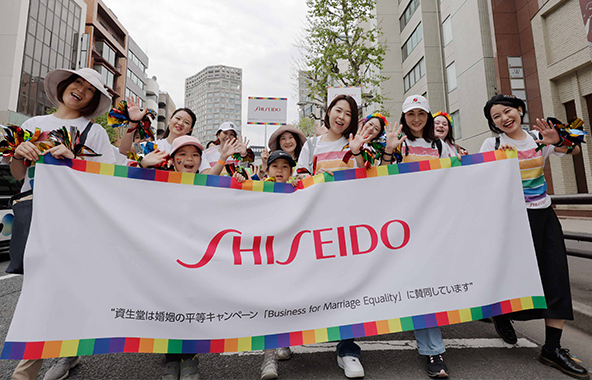
Tokyo Rainbow Pride 2024 parade
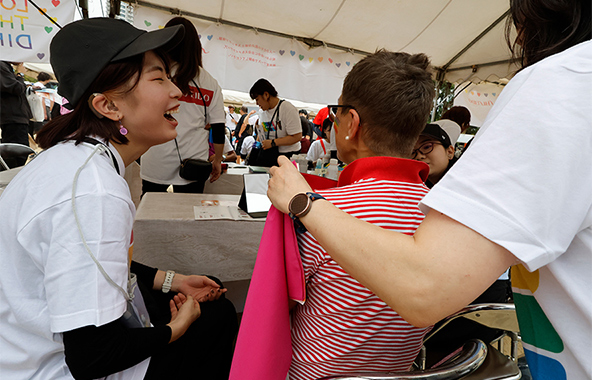
Rainbow Festa! 2024
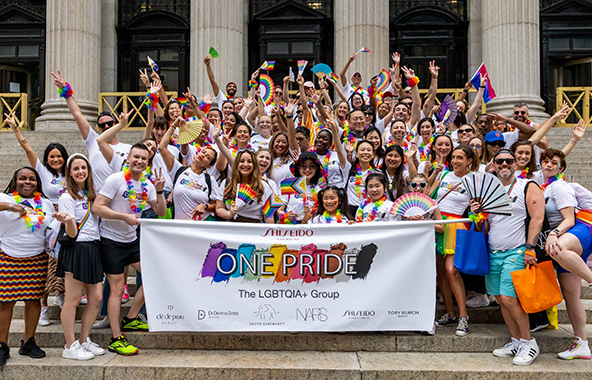
New York City Pride parade
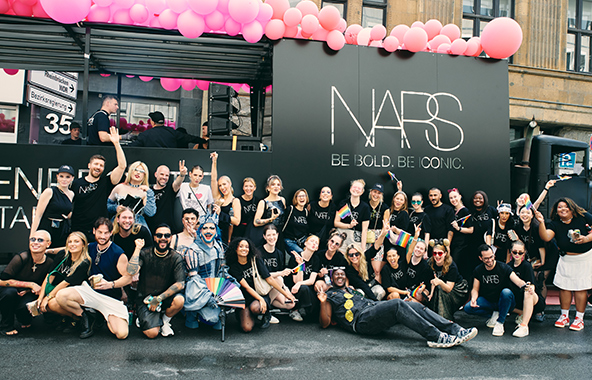
ColognePride 2024 parade in Germany
“Expressing Your True Colors -A Makeup Guide for Transgender Women and Non-Binary Individuals-“ Released.
At Shiseido, we have developed various makeup methods tailored to different skin concerns and facial features. In June 2025, we released “Expressing Your True Colors: A Makeup Guide for Transgender Women and Non-Binary Individuals” with the aim of addressing the makeup-related concerns of transgender women and non-binary individuals, helping them to highlight their own unique charms.
In developing this makeup guide, we conducted surveys on makeup-related concerns and needs with the cooperation of LGBTQ+ support organizations, gathering diverse input from transgender women and non-binary individuals. Additionally, we conducted in-depth interviews, and the makeup guide was supervised and created by hair and makeup artists from the Shiseido Beauty Creation Center.
This makeup guide is particularly aimed at those who are new to makeup, introducing techniques to understand one's facial features and address concerns for each part, such as prepping the skin and doing makeup for the eyebrows, eyes, and lips.
Shiseido will continue to support transgender women and non-binary individuals in exploring their own unique charms.
Please download and view the details of makeup guide from the link below:
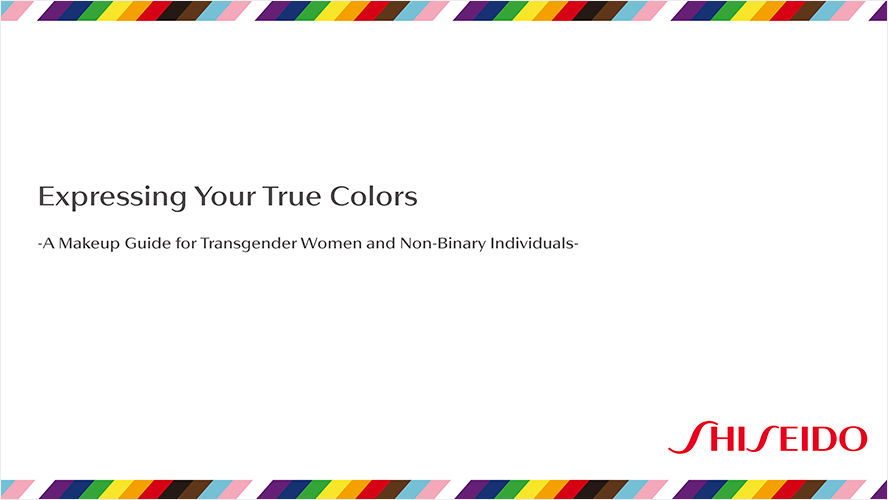
Expressing Your True Colors -A Makeup Guide for Transgender Women and Non-Binary Individuals-
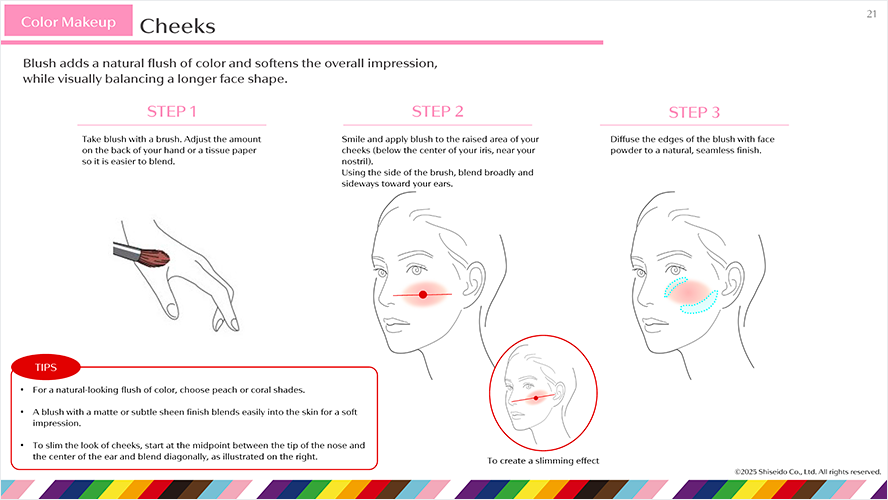
Color Makeup: How to apply blush
ABOUT US
- Who we are
- History
- Profile
- Governance
- Quality Management
- Supply Network
- Region/Business
BRANDS
- Prestige
- Premium
- Inner Beauty
- Life Quality Makeup
SUSTAINABILITY
- Strategy / Management
- Society
- Environment
- Governance
- Reports / Data
- Related Information
INNOVATION
- Research and Development
- Research Areas
- Research outcomes
- Product safety
- Product Development Policy
- Initiatives for doctors and researchers
CAREERS
INVESTORS
- IR Library